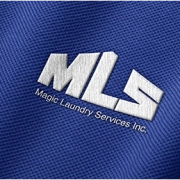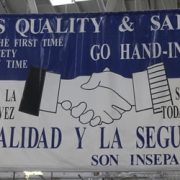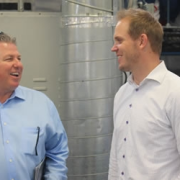
Los Angeles-area hotel industry specialist Magic Laundry Services is faithfully moving ahead with a $4-million plant upgrade. The company anticipates a quick return on the investment, thanks to some new business in its pipeline, as well as confidence in several key factors that it believes will boost interest in outsourcing, and increased throughput and efficiency in its operations.
These factors include:
- Significant appeal of laundry outsourcing to prospects in the lodging industry in water-starved California
- Substantial laundry efficiency gains likely to result from upgrading equipment
Owner Harry Kertenian senses growing appreciation among California hoteliers in the value of saving water. He points to a San Diego news report indicating those who recently closed their on-premises laundries (OPLs) have saved seven percent on their water bills, justifying their decision to outsource.
He was also jazzed by the washroom equipment he saw on visits to plants in England on TRSA’s 2015 European Laundry Tour in June. So he’s replacing two 10-module tunnel washers barely 10 years old (used since Magic opened in 2004) with larger-capacity Kannegiesser models. This switch will occur in one of the two adjacent Magic plants in Montebello, CA. This same facility will retain its seven ironer lines.
The other plant, just four years old, will retain its two Milnor tunnels with four ironer lines, while three more such lines will be added.
Complementing the tunnel substitution and ironer addition are other processing improvements that promise to conserve resources and control costs, such as energy-efficient dryers and greater use of conveyors and rails.
Magic recently converted all 16 of its open-pocket washer/extractors to the Smartex brand from Turkey. Their built-in water recycling units work with storage tanks that capture otherwise lost rinses for reintroduction into initial wash phases. The Smartex machines have averaged one gallon per laundry pound.
The intrigue of this investment prompted Magic’s engineering team to visit the Turkish factory late last year. “This is a revolutionizing technology because these open-pocket washers act more like tunnel washers,” Kertenian explains, with the benefit of high G-force for extraction. The resulting decrease in drying from this super-spin led to an incentive from Magic’s natural gas provider.
Washer-extractors are essential to Magic as a customer-owned goods (COG) provider; they handle smaller, custom-formula loads so individual accounts’ items are washed together and easily tracked.
Radio frequency (RF) ID tracking is also part of the equation, identifying bags associated with each customer as they enter the wash. This system from Softrol also prints out a confirmation that the load has been washed. Softrol and Kannegiesser are working with Magic staff to find new ways to take greater advantage of RF to further automate COG processing and service.
Kertenian sees the concurrence of the TRSA European Laundry Tour and the California water crisis as a major driver of the decision to move forward with Magic’s upgrade. “What we saw touring in London made us realize that investing in the future now was the right way to go, especially at such a crucial time with water,” he explained. “Since we started the business, we’ve known we’ve needed to steadily find ways to be more efficient.”
Now, with the company established as a preferred supplier to the majority of high-end hospitality brands, including casinos, Magic wants to live up to its continuous improvement reputation. “We knew we would grow and continue to grow because we would be recognized for excellent service and wash quality. We are jumping eagerly into this expansion.”





